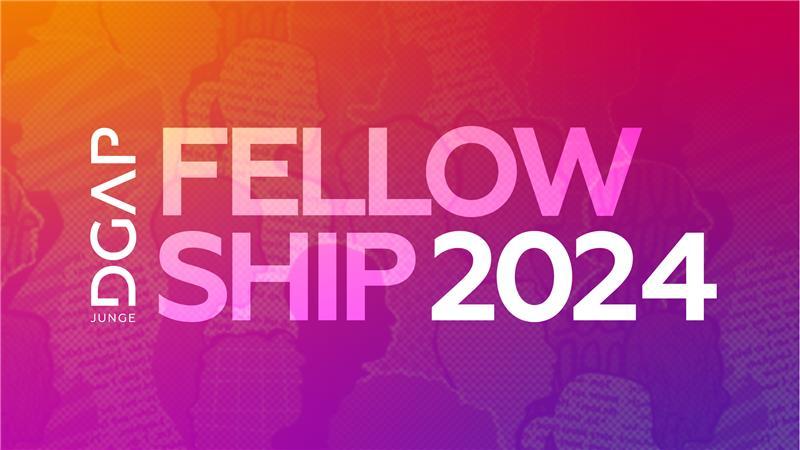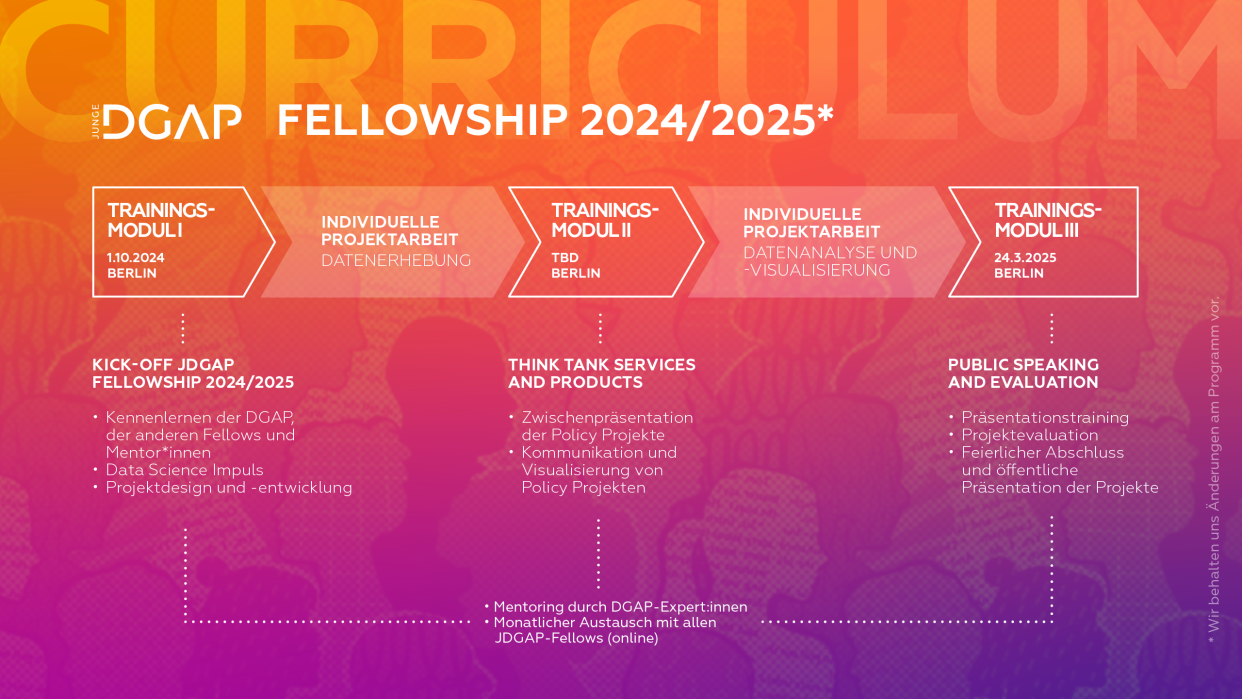At a Glance
Duration of the current cycle: October 1, 2024, to March 31, 2025
Number of fellows: 4
Location: Berlin and online
- Young DGAP
-
Founded in 2008, Young DGAP offers programs and innovative event formats tailored to young foreign policy professionals. These are created as additional DGAP offerings for all members under the age of 35 that offer information and networking on topics such as training, getting started professionally, and careers. In particular, we also call on our young members to get involved, e.g., to initiate and carry out events themselves. Young DGAP aims to provide its members with a helpful, inspiring platform through which to become active in foreign affairs and to set YOUNG impulses in foreign policy!
Program Description
As part of a Young DGAP Fellowship, each fellow develops his or her own policy project in collaboration with experts from the DGAP Research Institute. Through this connection, fellows can help shape debates on foreign and security policy internally at (Young) DGAP and represent it externally, for example by organizing and participating in panel discussions or by giving keynote addresses. The fellowship can serve as a springboard for making one’s own expertise known to a wider professional audience and gaining experience in think tank work. A Young DGAP Fellowship offers a wide range of opportunities to deepen one’s knowledge in the field of foreign policy and to expand one’s network in politics, academia, and civil society. In all of this, fellows can draw on the experience, expertise, and networking of the DGAP Research Institute.
Professional guidance throughout the fellowship is provided by a mentor from the DGAP Research Institute. These mentors are contact persons for all content-related questions. They also support the fellows in the development and implementation of their innovative policy projects, provide assistance, and open doors to the policy world.
Target Group
We are looking for highly motivated students (at least with a Bachelor's degree) or young professionals (up to 35 years old) with solid experience in data science and an interest in foreign policy issues. Applicants should demonstrate skills and experience in one or more areas of data science, including
- Data collection and processing as well as creation of (interactive) visualizations or web apps, e.g. using Python, JavaScript or other open source solution
- (Interactive) visualization/storytelling with dat
- Creativity in data research
- Motivation and interest in trying out new methods and techniques
We attach particular importance to applicants being able to apply their skills in the field of data science specifically to foreign policy issues. With their professional and methodological background, the fellows support the piloting of innovative approaches in the analysis, advice and communication of foreign policy in cooperation with DGAP experts.
We are looking for candidates whose professional and methodological background complements the profile of the teams at the research institute, e.g. through advanced studies/degrees in data science, information design, social and business communication or design thinking.
The Young DGAP Fellowship aims to promote diversity in policy advice and design and to involve underrepresented groups in this field. We particularly encourage people with a history of migration, disabilities and first-generation academics to apply.
Membership in the Young DGAP is not a prerequisite for participation.
Main Topics for 2024/2025
In cooperation with the DGAP Research Institute, the projects in the 2024/2025 cycle focuse on data science as applied to these four topics:
- Topic 1: Successful Cyber Norms: A Data-Driven Approach to Ensuring Security in Cyberspace
-
As our society becomes increasingly reliant on digital infrastructure, the establishment of cyber norms—shared expectations about acceptable behavior online—has never been more critical. The project "Norms in Cyberspace" analyzes the development and impact of these norms, highlighting how they shape international cybersecurity policies and promote a safer digital environment.
The objective of the fellowship is to develop a framework for quantifying and analyzing international relations in cyberspace, with a specific focus on measuring the success of norms in this domain and understanding why some are more effective than others. This will be achieved by observing various variables, identifying correlations and trends, and creating predictive models. The collected data will be presented in a visual and accessible manner to help policymakers navigate this complex field. This deep, data-driven understanding of successful cyber norms will offer valuable insights for designing and implementing more effective strategies in the future, ultimately enhancing global cybersecurity efforts.
Mentor:
- Topic 2: The impact of AI in the super election year 2024
-
At a time when maintaining and restoring trust in democracy is a central concern of the German government and the EU, our project is dedicated to the quantitative investigation of the increasing use of AI in the context of elections. The focus of the DGAP Center for Geopolitics, Geo-Economics and Technology as part of the AI / Democracy Initiative is particularly on the upcoming US presidential election and the next German parliamentary elections. The aim is to identify trends and vulnerabilities arising from the use of AI in election campaigns and from so-called threat actors that attempt to strategically manipulate voters. Project focus:
- Analyzing the use of AI in political campaigns and its impact on democratic processes
- Focus: US presidential election and upcoming federal election
- Identification of trends and vulnerabilities through AI-supported election influencing
Mentor:
- Topic 3: New Alliances in Global Health Governance
-
The current global order is experiencing a significant transformation. Humanity faces emerging existential challenges, growing inequalities within and between countries and generations, competing global strategies among great powers, fragilities in the multilateral system, and major military conflicts. There is a clear gap between these global challenges and the current global governance system. Innovation is needed to better address the many challenges our world is currently facing. While most global governance research focuses on qualitative methods, this project aims at applying data sciences methods to this qualitative-research-focused field.
The Covid-19 pandemic revealed the inadequacies in global health governance in responding to global crises. This project aims to leverage data science to identify and foster new forms of multilateral cooperation involving non-state actors and non-traditional constellations in global health governance and beyond. Special emphasis will be placed on private-public cooperation models across political domains, their involved public and private actors (e.g., foundations, businesses, civil society organizations), and networks, as well as their applicability and transferability to global health governance.
Potential project ideas could include using data science techniques to map actors and public-private partnership models, identifying networks, and analyzing their effectiveness. Thereby, this project aims to provide actionable insights and foster innovative solutions to enhance global health governance and address global challenges more effectively. In addition to the general application documents, applicants are asked to pitch a project idea (max. two paragraphs).
Mentor:
- Topic 4: 70 Years of DGAP - A Data-Based Retrospective
-
The project "70 Years of DGAP - A Data-Based Retrospective" aims to comprehensively present the historical development and influence of the German Council on Foreign Relations (DGAP) using data-based analyses and visualizations. The focus is on the methodical processing and analysis of historical data in order to shed light on central events, thematic focuses or, for example, network dynamics of the DGAP over the last seven decades.
A data journalistic approach is used to process historical data, important events and key political events. The aim is not only to show developments over time, but also to make the networks and connections that DGAP has established during this period visible. Interactive visualizations are intended to help illustrate the reach and influence of the DGAP.
Close collaboration with DGAP's communications team will ensure that the results are presented in a clear and accessible way. This project aims to provide an engaging overview of DGAP's history and significance, while also serving as an example of the possibilities of innovative data visualization in historical research.
Mentor:
-
Fellows draw up a detailed project plan together with their mentors at the beginning of the fellowship. With the exception of topic 3, it is not necessary to enclose a project outline or pitch with the application documents.
An Accompanying Training Program
In addition to professional support, the fellows benefit from a structured training program. It accompanies the fellows in the process of implementing their policy projects. In interactive workshops, experts impart practical knowledge, tools and important framework conditions for innovative and effective think tank work. In addition, various networking activities take place where the fellows have the opportunity to get to know their mentors better and exchange ideas with other DGAP employees and beyond.
Participation in the training modules is a mandatory part of the fellowship. The curriculum is structured as follows:
In addition to receiving professional support, the fellows benefit from a structured training program. It accompanies the fellows in the process of implementing their policy projects. In interactive workshops, experts impart practical knowledge, instruments, and important framework conditions for innovative and effective think tank work. In addition, various networking activities take place, giving fellows the opportunity to get to know their mentors better and to exchange ideas with other staff members at DGAP and beyond.
Participation in the training modules is a mandatory part of the fellowship. The modules for the next cohort will be similar to those used in the previous cycle. The curriculum is structured as follows:
DGAP reserves the right to make program changes at any time.
Requirements
All Fellows are expected to actively participate in all training modules and the monthly Jour Fixe meetings as well as to work independently and autonomously on individual policy projects. A fellowship contract is concluded between DGAP and the fellows, which defines the mutual rights and obligations. After successful participation in at least 80 percent of all mandatory modules and completion of the policy project, the fellows receive certificates for their participation in the program as well as a one-year free membership in DGAP.
Languages
Very good knowledge of German and English (C1) is required for the fellowship. The working language with the mentors and for publications or events can be chosen individually; the training modules are held in German. The working language at the DGAP is predominantly German.
Payment and scope of work
Fellows receive a monthly allowance of €450. The weekly working time is 8 hours. Please note that Fellows must be registered as having their primary residence in Germany. If the place of residence in Germany is outside Berlin, travel expenses and accommodation during the three training modules will be covered within the framework of the DGAP guidelines.
Past Cohorts
The 2023/2024 Cycle
- Topic 1: Norms in Cyberspace
-
Mentor:in: Dr. Valentin Weber, Maria Pericàs Riera, Center for Geopolitics, Geoeconomics, and Technology
Fellow: Hannah-Sophie Weber
The DGAP project “Norms in Cyberspace” analyzed the emergence of norms within the United Nations’ Open-Ended Working Group (OEWG) and its Group of Governmental Experts (GGE) as well as in state-led cyber operations. In particular, it focused on better understanding how emerging technologies such as quantum computing, artificial intelligence, and the Internet of Things shape the character of cyber norms.
Against this background, the project of the Young DGAP Fellow examined how states define critical infrastructure. We visualized the data collected on a world map with interactive elements and made the results publicly available. The project ties into the 2021–2025 OEWG for the Security and Use of Information and Communications Technology and helps to create greater transparency and strengthen trust across borders. - Topic 2: Civilian Stabilization
-
Mentor:in: Florence Schimmel, Marco Schäfer
Fellow: Pauline Hoffmann
The societies of the Sahel states are confronted with armed groups, the effects of climate change, strong population growth, insecure governance and other challenges. Niger was long regarded as an anchor of stability in the Sahel region, whose democratically elected government shows no interest in Russian influence and pursues partnerships with many European countries. But the coup of July 26, 2023 is now changing the situation here too. The very fact that no one seems to have been prepared for this illustrates the lack of oversight in the numerous military and civilian collaborations. In view of current developments, the project can adapt dynamically; the activities of the accompanying project are also keeping this in mind.
The partnerships of the Nigerien government with international governments (e.g. Germany, France) and multilateral actors (e.g. United Nations, European Union, West African Economic Community) are of particular interest. Historical developments can be examined quantitatively, e.g. how economic and military cooperation with China, Egypt and Germany has changed over the years. Here, for example, a processing and presentation of previous deliveries of military material from various sources to the Nigerien government would be useful. In addition, qualitative studies can supplement the evaluation in order to develop explanations for any changes. It is also possible to take a look at the current structure of actors and visualize the confusing situation. - Topic 3: Influencers, Disinformation, and Democracy in the Digital Age
-
Mentors: Dr. Katja Muñoz
Fellow: Louisa Brög
Die Erhaltung und Wiederherstellung von Vertrauen in die Demokratie ist ein wichtiges Ziel der Bundesregierung und der EU. Das DGAP-Zentrum Geopolitik, Geoökonomie und Technologie geht im Rahmen des deutsch-amerikanischen Projekts „Influencer, Desinformation und Demokratie im digitalen Zeitalter“ diesem hochaktuellen und drängenden Thema nach und untersucht Desinformation und weitere Online-Schwachstellen in Demokratien anhand von Influencer:innen.
Weltweit werden digitale Räume durch eine wachsende Zahl von bezahlten Profis, staatlich unterstützten Agenten und ideologisch Motivierten manipuliert. Zugang zu immer leistungsfähigeren Werkzeugen vor allem im KI-Bereich und weiterhin schlecht geschützte Plattformen und der Abbau von Wahlintegritäts- bzw. Desinformationsbekämpfungsteams sind schlechte Voraussetzungen für 2024, wo weltweit bis zu 70 Wahlen stattfinden werden, u. a. Europa Parlamentswahl, U.S. Präsidentschaftswahl, sowie u.a. Wahlen in der Ukraine und Taiwan.
Das Fellowprojekt will quantitativ untersuchen wie in laufenden oder zukünftigen politischen Kampagnen vermehrt auch KI im Rahmen von Influence Operations genutzt wird, und sich auf deren Auswirkungen auf Politik und Wahlen und Kampagnen fokussieren.
- Topic 4: Climate Migration
-
Mentor: Mechthild Becker
Fellow: Michelle Grunwald
Climate-induced migration is not a fictitious future scenario, but is already a reality. In the past decade, more than 20 million people have been forced to flee their homes every year due to climate and weather-related disasters. Even if the 1.5-degree limit is adhered to, scientific findings indicate that the situation will worsen significantly in the future. In many places, global warming will lead to a deterioration in living conditions, and higher levels of warming may even make certain areas uninhabitable. The opportunity to migrate will therefore become an instrument for ensuring survival.
German foreign and development policy, and to some extent also domestic policy, must take this reality into account. Despite intensive scientific research on the topic, there is a lack of concrete political progress that would improve the situation of people who are forced to migrate in the context of climate change. In this context, we want to make a joint contribution in our partnership with the Robert Bosch Foundation through targeted policy advice and networking.










